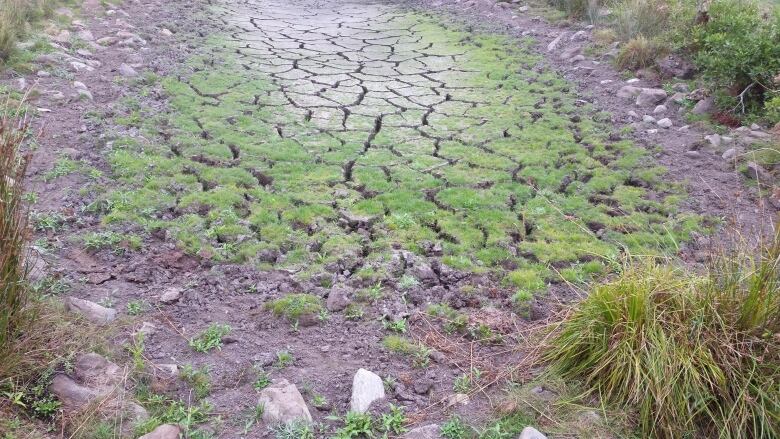Nova Scotia farmers worried about winter after dry summer
Farmers have already started feeding animals winter hay

Unusually dry summer conditions are hitting many Nova Scotian farmers hard, with some slaughtering animals ahead of schedule and wondering how they'll have enough hay to feed other livestock through the winter.
Amy Hill owns Snowy River Farms in Cooks Brook, N.S. She said they normally process their lambs at the end of October, but this yearthey'll have to slaughter them two months early.
"If I didn't, I'm out of pasture at this point and I'd have to start feeding them hay, and it's just not feasible.
"I'll switch the ewes onto hay and hope that I have enough to get them through the winter."
'It's justlike sand'
Hill also produces pasture-fed pork on her farm. She said the pigs who need water to cool themselves down, as they don't sweat normally go into the woods, where they can dig down and wallow in the mud they find.
But she told CBC's Information Morning thatthis year, the sows have dug down about a metreand found nothing.
"It's just like sand. It's bone dry"

Trucking water from town
Trevor Perry owns Forest Hill Farm in Chebogue, near Yarmouth, and produced beef cattle. He said the dry conditions are especially unusual in that part of the province.
"It's really is not something we're used to dealing with at all," he said.
Perry said he normally depends on ponds in his pastures to provide drinking water for his cattle, butmost of the dozen pastures are completely dry.
"I'm hauling water 20 minutes away from the town water supply, filling up totes from the back of the truck just to water cattle," he said.

'It doesn't look good'
This isn't just a problem for drinking water:Perry said without rain, the pastures he uses to feed the cattle are not providing enough grass, forcing him to use a limited supply of hay that he'd normally save for the winter.
"Usually we don't feed hay until end of November, first of December, depending on the kind of year we're having," he said."And already we're at the point where we're going to have to start feeding hay to keep the cattle sustained."
Perry said that at this point, recovering from a long summer without much rain would be difficult.
"I'm really not sure what we'd get back even if it started raining today.
"It doesn't look good at all."
With files from CBC's Phlis McGregor and Information Morning












_(720p).jpg)


 OFFICIAL HD MUSIC VIDEO.jpg)
.jpg)



























































































